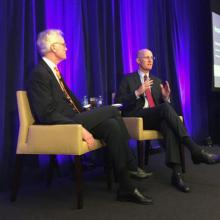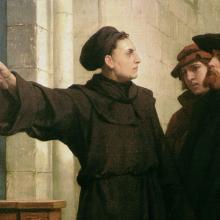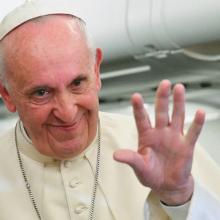lutherans
Rohrer’s resignation as bishop of the Evangelical Lutheran Church in America’s (ELCA) Sierra Pacific Synod, followed months of conflicts that destroyed reputations and livelihoods, permanently severed relationships, and left a church worshipping in a rainy parking lot. Sources within the ELCA told Sojourners that Rohrer’s resignation prompted sadness and denial, anger and celebration.
Critical to the success of the movement is the fact that corporations are not simply tolerating activists such as Daly.
Instead, they increasingly see the socially responsible agenda as good business; and, perhaps more important, so do investment firms that are responding to the growing demand for portfolios that reflect a client’s values while also making money as effectively as any other investment.
Some Protestant churches mark the day as Reformation Sunday, and celebrate it on the Sunday just before, or just after, Oct. 31. More often than not, the hymns sung in church that day include “A Mighty Fortress Is Our God,” with words and music composed by Luther himself. But most members of Lutheran churches — the direct descendants of Luther’s movement — wait until Oct. 31. And that, as we know, is also Halloween, and has led to some creative celebrations for kids.
Pope Francis leaves on Monday, Oct. 31 for an overnight trip to Sweden, a historically Protestant country that today is one of the most secular in the world.
The visit is to mark the start of observances of next year’s 500th anniversary of the Reformation, which traditionally dates from Oct. 31, 1517, when Martin Luther nailed his 95 Theses to the door of a German cathedral.

Pope Francis leads the “Via Crucis” (Way of the Cross) procession, which commemorates the crucifixion of Jesus Christ, at the Colosseum in Rome on April 3, 2015. Photo via REUTERS / Alessandro Bianchi / RNS
Despite Luther being thrown out of the Catholic Church during his lifetime, the Vatican reacted positively to news of the square’s upcoming inauguration.
“It’s a decision taken by Rome city hall which is favorable to Catholics in that it’s in line with the path of dialogue started with the ecumenical council,” said the Rev. Ciro Benedettini, deputy director of the Vatican press office, referring to a gathering of churchmen to rule on faith matters.

Jesus healing the lepers, © Daniel W. Erlander, http://danerlander.com
I have to say, one of my very favorite things about Jesus is how he does whatever he wants to and could really give a hell about how other people feel about it. Yeah. I just find that endearing — especially when he irritates the nice religious people. That’s secretly my favorite.
In our Gospel text for today Jesus is teaching in the synagogue on a Sabbath when he sees a woman with a crippled back. He saw her, called her over and said “Woman you are set free from your ailment.” He reached out and touched her and she stood upright for the first time in 18 years and praised God — which seems like a win. Except for that then the leader of the synagogue throws a little tizzy about how that kind of thing should not be happening on the Sabbath. Further proof that super religious people can just be so helpful, can’t they?
Especially when they seem to value parameters over people – which should sound like a familiar story …
Stories of churches denying your call to ministry because you fall outside the parameters of which gender is allowed to be ordained and stories of churches denying you the Eucharist because you fall outside the parameters of what kind of sexual orientation is allowed to receive the means of grace and stories of churches denying you a place in community because you just weren’t sure if you believed in God and that falls outside the parameters of doctrinal purity – well, these kind of stories are sadly bordering on cliché around here. We hear them all the time.
VATICAN CITY — Lutheran leaders have warned the Vatican that the creation of a structure to welcome conservative Lutherans into the Catholic Church would harm dialogue and damage ecumenical relations.
In 2009, Pope Benedict created a special church structure, called an ordinariate, to allow disgruntled Anglicans to convert to Catholicism while maintaining bits of their traditions and culture.
Ordinariates have been created in the U.S., England and Australia, attracting hundreds of conservative Anglicans who oppose female and gay bishops and who seek greater lines of authority.
In recent weeks, senior Vatican officials publicly suggested the creation of a similar structure for disaffected Lutherans; the idea was first floated last October by Cardinal Kurt Koch, the Vatican chief ecumenist.
According to Catholic media reports, Archbishop Gerhard Ludwig Mueller, who heads the Vatican’s doctrinal office, said on Jan. 11 that if Lutherans asked for the creation of an ordinariate, the Vatican would consider their request.
Mueller’s words were swiftly rebuked by the Rev. Martin Junge, general secretary of the Lutheran World Federation. “The creation of such a special structure would have deep ecumenical repercussions,” he warned on Jan. 18.
DURHAM, N.C. — Protestants have traditionally celebrated Oct. 31 as the anniversary of the start of the Protestant Reformation, a movement that divided Western Christendom and gave birth to such diverse religious groups as Lutherans, Presbyterians, Anglicans, and Mennonites.
On Oct. 31, 1517, an Augustinian friar named Martin Luther nailed 95 theses for debate on the door of the Castle Church in Wittenberg, Germany, and so sparked a religious reform even he could not control.
But Luther's public life actually began five years earlier, 500 years ago this week, on Oct. 19, 1512, when he finished his formal theological education and was installed as a professor of Bible at a relatively new and still nonprestigious Catholic university in Saxony.
No one, least of all his patrons, expected this soft-spoken young man with a tenor voice and a bubbling sense of humor to turn into a religious bomb thrower, whose theological convictions would alter the religious and political structures of Europe for five centuries. Indeed, no one could have been more astonished by this unexpected development than Luther himself.





